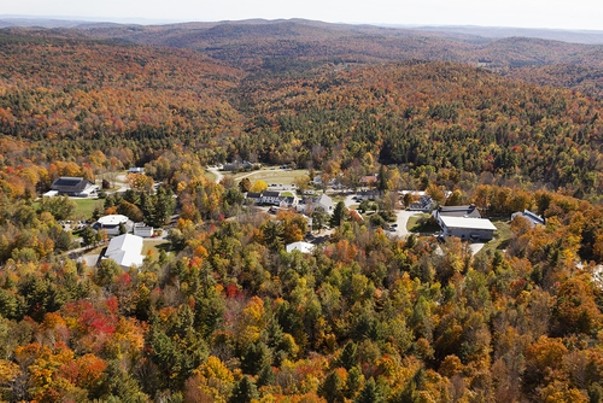
- Calebjc / Wikimedia Commons
Marlboro Music will buy the former Marlboro College campus from Democracy Builders, the higher ed nonprofit whose former leader was arrested earlier this year.
The deal puts the scenic hillside campus, known as Potash Hill, under the control of its longtime summer tenant, which hosts the annual Marlboro Music Festival there. It also resolves a legal dispute between Democracy Builders and
a mysterious cryptocurrency entrepreneur who had laid his own claim to the property.
“We are delighted to announce this historic agreement enabling us to protect Potash Hill and our use of the campus,” Christopher Serkin, Marlboro Music’s president, said in a press release.
The parties did not immediately disclose the terms of the arrangement, including the purchase price. But
a joint press release indicated that the cash-strapped Democracy Builders was abandoning its plan to start a college program there.
click to enlarge 
- Derek Brower ©️ Seven Days
- Marlboro College campus
"We have come to realize that Potash Hill is just not practical for our operations," Democracy Builders board chair Alize-Jazel Smith said in the release. "We are glad that the campus will be protected, and we look forward to moving on to the next chapter in pursuit of our vital mission.”
Democracy Builders purchased the campus in 2020 after Marlboro College merged with Boston-based Emerson College following years of declining enrollment. The deal was controversial in the small southern Vermont town, where many were stung by their college's demise and distrusted Democracy Builders' founder, Seth Andrew.
Just months after buying it, Andrew struck a deal to resell the property to a Canadian businessman, Adrian Stein, who wanted to use Potash Hill as the site for an annual convention related to his yet-to-exist cryptocurrency, "Chronotanium." The sale later fell apart, but only after Andrew had already transferred the title to Stein, leading him to claim ownership rights.
Marlboro Music then asked a Windham County judge to decide who was responsible for the campus' upkeep. Thursday's announcement settles the matter.
The purchase price will become public at some point, Marlboro Music communications director Brian Potter wrote in an email, but he declined comment for now, citing "additional campus related negotiations" that are ongoing.
The deal does not include any provisions for an ongoing relationship with Stein's company, Type 1 Civilization, Potter wrote, though the organizations have "cordial relations."
In the press release, Stein said he was "delighted" that the litigation was resolved amicably "and in a manner that ensures that the campus will continue to serve as the home of the world-renowned Marlboro Music Festival.” He declined further comment, as did his attorney.
Marlboro Music has been using the campus for its summer festival since 1951 and has spent more than $15 million in recent years on physical upgrades to the property, according to the nonprofit.
Serkin, Marlboro Music's president, said he would ask the organization's board members to halt off-season use of the facilities while the nonprofit plans its transition from tenant to owner and consults with "our friends and patrons, town residents, conservationists, and other vital constituents" about next steps.
"It will allow us to consider off-season uses that are compatible with our summer program and community," Serkin wrote in the press release, "and to begin seeking grants and contributions for a fund dedicated to covering the annual costs for properly maintaining this beautiful and historic property for generations to come.”
Thursday's news was well received by many locals in Marlboro, who had seen the festival, with its long track record at the site, as an ideal owner amid mounting uncertainty. Adrian Segar, a former Marlboro professor who was critical of Democracy Builders, said the deal was "a sigh of relief."
"It's what I think everybody has been hoping for," he said.
Segar added: "The campus will be in the hands of people who are reasonable, smart and hopefully able to find good uses for it when the festival is not in session."

















































